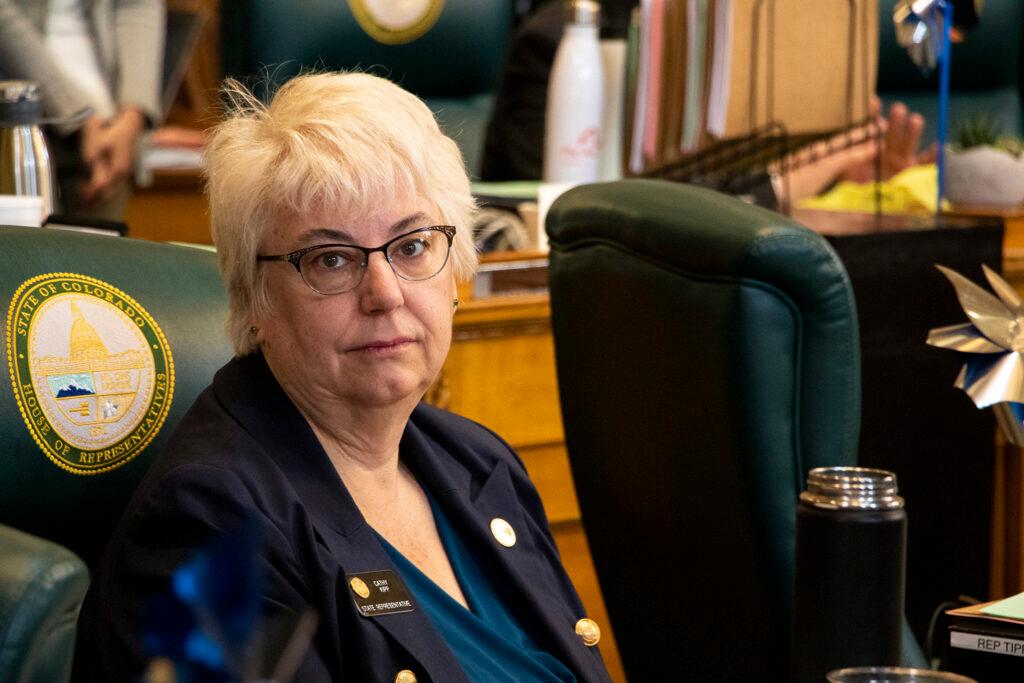
Colorado state lawmakers have introduced a bill that would add substantial new restrictions to who can access public records, and create a new category to delay the release of records to Coloradans deemed too nosy about how government works.
State Rep. Cathy Kipp’s bill, HB24-1296, would, among other things, allow state and local governments to label someone a “vexatious requester” and deny them access to public records for 30 days. Republican Rep. Matt Soper of Delta and State Senator Janice Marchman, a Loveland Democrat, signed on as co-sponsors.
A vexatious requester would be defined as someone who “demonstrates an intent to annoy or harass.” There are several factors records custodians can consider in determining whether someone is vexatious, like the “subject matter of requests” or “unreasonable burden.”
Once labeled vexatious, the citizen could — at their own expense — appeal the decision in court, where a judge could remove the label and restore access to public records.
Since 1968, the Colorado Open Records Act, commonly referred to as CORA, allows members of the public to request almost any government record. There are exemptions to protect private information from release, like someone’s address or trade secrets, for instance. And governments can charge an hourly fee before producing the records.
“I’ve been hearing a lot of stories from our local governments particularly as things have become increasingly politically heated over the last several years, that there's been a lot what I would call abuse of the Colorado Open Records Act,” said Kipp, a Democrat from Fort Collins and former Poudre School Board member. “There have been cases where people have filed CORA requests on a particular organization every single day or every three days or whatever that number might be.”
Those requests can take up a lot of time and resources from state and local governments, she said. Though, she has not provided specific examples of this abusive requesting. Governments have the right currently to ask a requester to narrow the number of records they are seeking to reduce the time needed to respond.
First Amendment attorney Steve Zansberg, who represents news media organizations including CPR News, said the bill does nothing to advance transparency.
“This is a bill that is moving backwards, and putting up hurdles for ordinary citizens, and to some extent members of the press, in obtaining access to government-held but public records,” said Zansberg. “And our view is anyone who seeks to move backwards and to make matters worse as this bill does there's the burden of coming forward with documented proof of the need to do so, and I haven't heard or seen any such documented proof here.”
Trying to define who is or isn’t “vexatious” is fraught, according to advocates for public records. Following pushback from news stakeholders during the bill’s drafting, Kipp added a provision that news media cannot be labeled vexatious under the bill.
If someone is deemed vexatious by a government agency, the remedies could be costly, said Jeff Roberts, executive director of the Colorado Freedom of Information Coalition.
“This now would require that person to go to court to get that label removed and to incur the expenses of that and the time it takes to do that, probably get a lawyer to have to do that,” said Roberts. “That's a lot of power to give the records custodian.”
Dana Duggan, with the citizen group West Side Watch in Colorado Springs, has used CORA requests to gain a better understanding of government decisions funded by taxpayer dollars. She was adamant that she is not a “vexatious requestor.”
“One could argue that any political leadership that is trying to limit public access to the data that we own and fund could be called a vexatious politician,” said Duggan.
Fees already act as a check on people who might wish to spam governments with CORA requests. Officials can charge around $30 per hour for their time to collect, review and redact records. Seemingly simple requests can cost hundreds, even thousands of dollars to fulfill.
“They slap charges on most of this data and you pay a pretty penny to get it,” said Duggan.
Kipp counters that the money recouped by governments for records doesn’t fully pay for the actual time and resources spent on the request.
The bill also allows government officials to charge the actual cost of providing public records to companies that use the records for “pecuniary gain.” Or to companies that use the records to solicit business.
The bill would also allow governments to deny the release of “any record containing information that, if disclosed, would invade another individual’s personal privacy.”
It’s not clear what exactly that means. Kipp said she took the language from the federal Freedom of Information Act.

Under current law, it’s not uncommon for governments to estimate charges of thousands — or tens of thousands — of dollars to review and produce records responsive to citizen requests. In many cases, the requester is deterred by the cost of pursuing the record further.
Now, each of the additional exemptions Kipp proposes to CORA could add to the time it takes for government workers to review requests for records and then review the records to be sure nothing exempt is released. The cost of records could be driven up, as would what Kipp believes is the unreimbursed time governments spend on CORA responses.
The undefined exemption for records that might invade a person’s privacy is of particular concern to news media representatives. Roberts, a former Denver Post journalist, said current statute and case law already protects certain personal private information from release.
The bill would also allow governments to deny access to the calendars of most government employees. The calendars of elected officials and “employees in leadership positions” however would still be public records. “Leadership positions” is not defined. Calendars for all employees could still be released to news media under the bill. But even the definition of “media” is subject to debate.
Kipp said it is an attempt to limit someone using public records to stalk someone.
“So if somebody had like a recurring appointment, three o'clock every Tuesday this person is at this location, that could be a way for somebody to be stalked,” said Kipp.
Stalking is already against the law in Colorado.
Kipp met with businesses and news media organizations, including representatives of Colorado Public Radio, as she prepared the bill. She said that news organizations objected to these new CORA restrictions, so she created carveouts for news media from the provisions restricting vexatious requesters or making government worker calendars secret.
“I’m not at all trying to put barriers in front of news media,” said Kipp. “We're just trying to make it easier for people, for agencies to comply with the law.”
Roberts works closely with news media and the general public to help them access public records, and he said the news media shouldn’t have exclusive access to government documents and data.
“What about people in the public who are just trying to find out what's going on with their government?” said Roberts. “It's creating more obstacles and more delays, making it harder for people to obtain public records in Colorado when it's already hard. In a lot of cases, there are already obstacles.”
Correction (2/17/2024): State Sen. Janice Marchman is from Loveland. She represents parts of Larimer and Boulder Counties in the state senate.
- Colorado one of at least 6 U.S. states considering tougher penalties for killing police dogs
- Out-of-state patients keep coming to Colorado in record numbers as abortion remains a political fight in 2024
- New UNC medical school and wave of funds proposed to train Colorado doctors, veterinarians in bipartisan bill








